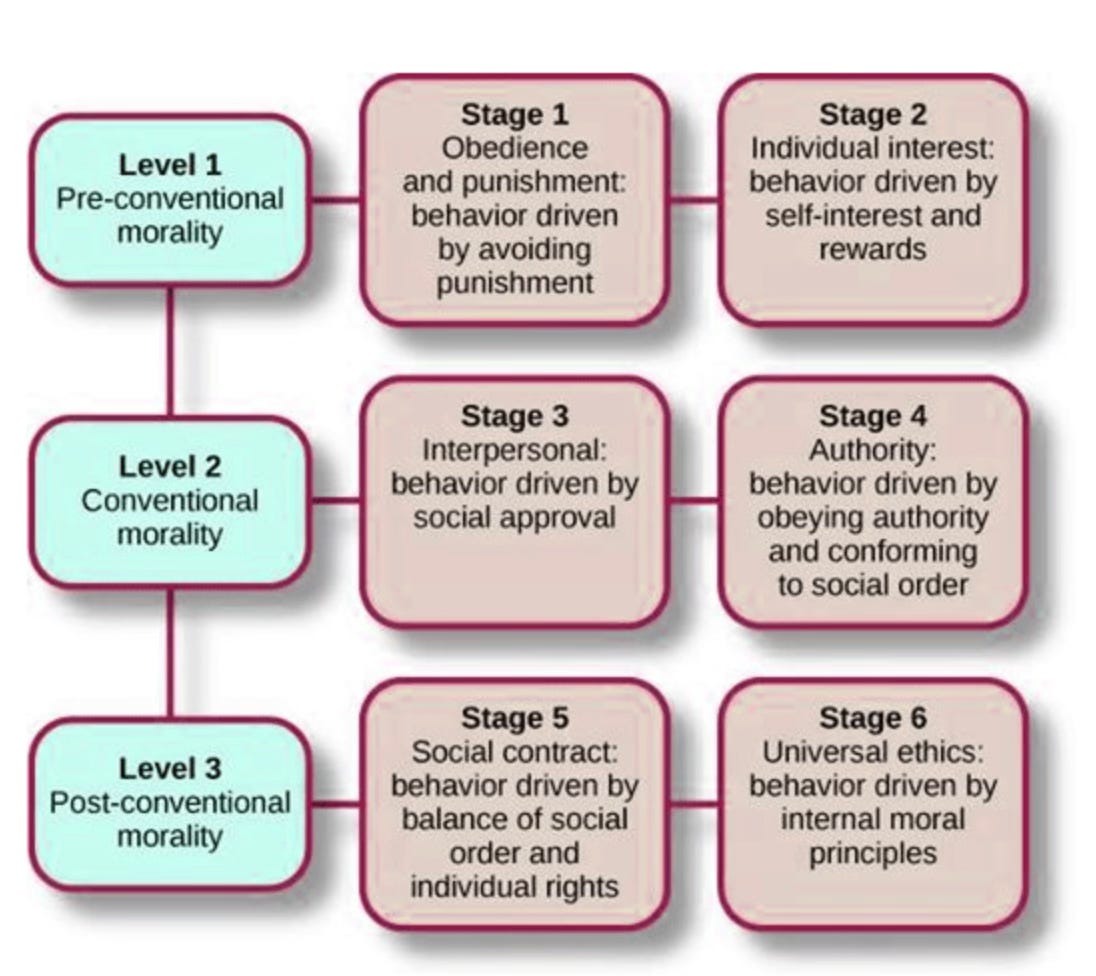Arrested moral development
Lawrence Kohlberg's Stages of Moral Development and the leadership we deserve
Near my home in Silver Spring, Maryland there is a sign on a telephone pole — well-drawn letters descending the pole for all to see: EMPATHY. A good reminder. Empathy is one of those qualities we admire, and there is not enough of it. From Merriam-Webster:
Empathy. noun. 1: the action of understanding, being aware of, being sensitive to, and vicariously experiencing the feelings, thoughts and experiences of another.
How do we get to this kind of understanding? It seems like an important quality, the whole “Do unto others” thing I wrote about here back in May — Guidelines: why it’s hard to get kindness right.
When visiting charter schools — part of my career as an executive coach for senior leaders — I saw artifacts of what might be termed the “culture” of each school: the vibe in the hallway; the way teachers called their class to attention, or redirected certain behaviors; and the prevalent signage. The latter included the motto of the school, norms for behavior in the hall, inspirational quotes. My favorite was writ large on the wall outside the gym in Houston: “Impossible is nothing.”
One particular sign, a sort of frieze above the lockers in a Harlem middle school, depicted the six stages of moral development developed by Lawrence Kohlberg. I had been introduced to this concept years before by my late father-in-law Richard A. Graham who, at one point in his career, served as the director of the Center for the Study of Moral Development, founded by Lawrence Kohlberg at the Harvard Graduate School of Education in the early 1970s.
The idea is that everyone progresses through successive levels of moral reasoning, starting with the most basic — seeking reward and avoiding punishment. Kohlberg believed that we move from one stage to the next as a result of brain development, social circumstances, and the more advanced moral reasoning we see modeled around us.
Any depiction of the six levels is necessarily an oversimplification. This diagram might help us understand the very basics of Kohlberg’s idea:
Somewhere between 2016 and 2020, my brother-in-law John Graham wrote a thoughtful, well-researched paper which attempts to get a bead on our head of state. I feel it important to highlight some of his findings here.
John Graham’s study defines moral development this way:
The underlying premise for Kohlberg’s defining theory is that “each higher stage has a more internalized and autonomous idea of moral rules, a greater concern about the welfare of others, a broader concept of fairness,” (Kohlberg, 1976, p.41) and that as we begin to recognize and understand the more advanced form of justice at the stage above our own, we prefer it as more just and transition to it. Kohlberg cites Plato on this: “He who knows good, chooses good.” (Kohlberg, 1981, p.30). Fully universalized justice – a “primary regard for the value and equality of all human beings” is the pinnacle of moral development, Kohlberg’s Stage 6. (Kohlberg & Hersh, 1977, p. 56).
Graham then proceeds to describe each stage, which can be summarized along these lines:
Pre-conventional: moral reasoning based on reward and punishment:
Stage 1: The consequences of action determine its goodness or badness. “Good” acts are rewarded, and “bad” acts are punished. Avoidance of punishment and unquestioning deference to power produce an underlying moral order supported by dutiful deference to authority. One’s moral value (and that of others) is based on “status and property.” Those in Stage 1 do not understand that justice includes reciprocal and equal exchanges.
Stage 2: Actions are those that instrumentally satisfy one’s own needs and occasionally the needs of others. Human relations are viewed in terms of those of the market place, and people are valued in terms of their utility. The Stage 2 thinker “recognizes nothing higher than individual needs” (Kohlberg, 1971, p.230)
Conventional: moral reasoning based on external ethics:
Stage 3: The interpersonal “good boy-nice girl” orientation. Just behavior is that which pleases or helps others and is approved by them. Being good means acting to honor aspects of mutual relationships such as trust, loyalty, respect, and gratitude. Desire to maintain rules and authority that support stereotypical good behavior.
Stage 4: Based on principles of law and order. There is orientation toward authority, fixed rules, and the maintenance of the social order…fulfilling the duties to which you have agreed, showing respect for authority, and adherence to norms established by accepted social and legal expectations and obligations. To keep the institution going as a whole, to avoid a breakdown in the system.
Post-conventional or Principled:
Stage 5: Social-contract legalistic orientation. It includes deference to the legal point of view, but with an emphasis on the possibility of changing laws based on rational considerations of social utility and truer justice. Kohlberg considered Stage 5 to be the predominant morality of the American government and the level of justice at the foundation of the Constitution. (emphasis mine)
Stage 6: Universal ethical principle orientation. Right is defined by the decision of conscience in accord with self-chosen ethical principles that appeal to logical comprehensiveness, universality, and consistency. At heart, these are universal principles of justice, of the reciprocity and equality of human rights, and of respect for the dignity of human beings as individuals.
After outlining the salient points of each stage, Graham works backwards to locate evidence for the Moral Development Stage of the then-commander-in-chief.
As I re-read John’s paper today, I find it instructive to think not only about the individual but the words and actions of the cadre of supplicants and enablers that inhabit his world, and appear to be modeling the stage at which their boss operates.
Here are highlights of Graham’s findings:
Ruling out Post-conventional Stages 5 and 6
A well- documented history of violating social contracts that guarantee general individual rights and ignoring or manipulating personal agreements
Appears to have general disdain for justice and the rule of law, dismissing them as impediments to the quest for personal financial gain, power over others, and popularity
Primary goal is to further personal interests
Has demonstrated no interest in business deals built on principles of fairness and justice
Ruling out Conventional Stages 3 and 4
Intent on destroying any element of the status quo that provides no personal advantage
Ignores social and legal codes of behavior that lie at the core of Stage 4 justice
Does not look to society as a whole for guidelines about what is right because acting in ways that others would deem moral interferes with quest for personal gain
Violations of “Golden Rule” Stage 3: Chronic disparagement of the press; encouraging violence against protesters; reflexive insults of anyone who criticizes; demands loyalty from others, but almost never reciprocates
“Has zero psychological ability to recognize empathy or pity in any way.” (Reince Priebus in Woodward, 2018, pp. 235).
Pre-conventional Stage 2? Or Stage 1?
Elements of Stage 2 that fit:
Human relations are viewed in terms of those of the market place, and people are valued in terms of their utility
No sense of loyalty, gratitude, or justice
Reciprocity is tit-for-tat
“Recognizes nothing higher than individual needs”
Following rules only when it is in one’s immediate interest
Elements of Stage 1 that fit:
One’s moral value (and that of others) is based on “status and property”
Those with greater status and property have more power and the right to use it to their advantage
A punishment and obedience orientatioe with greater status and property have more power and the right to use it to their advantage
“Good” acts are rewarded and “bad” acts are punished
The research of Kohlberg and later James Rest (American psychologist, University of Minnesota) suggests most adolescents and adults in industrialized societies function primarily at the Conventional level — especially Stage 4 (“Law and Order” — maintaining social order and obeying the law).
We are all on a path, and have room to grow and develop. I get that.
But surely it is not unreasonable to expect the moral reasoning of our leaders to be greater than that of six year olds.
If that.


Notes
https://practicalpie.com/kohlbergs-stages-of-moral-development/





No wonder I can’t sleep at night .
Wow! This is such a thoughtful and deeply layered piece, Stew. I’m going to be honest: either the essay is a little too smart for me today, or I’m a little too fried for it (probably the latter 😅). But I’m struck by how much care and clarity you brought to some really big ideas, and how you always find these connections between theory and real-world behavior that I wouldn’t have seen on my own.
Definitely bookmarking for a reread when my brain has a few more tabs open. Just wanted to say I’m glad you’re writing and sharing pieces like this.